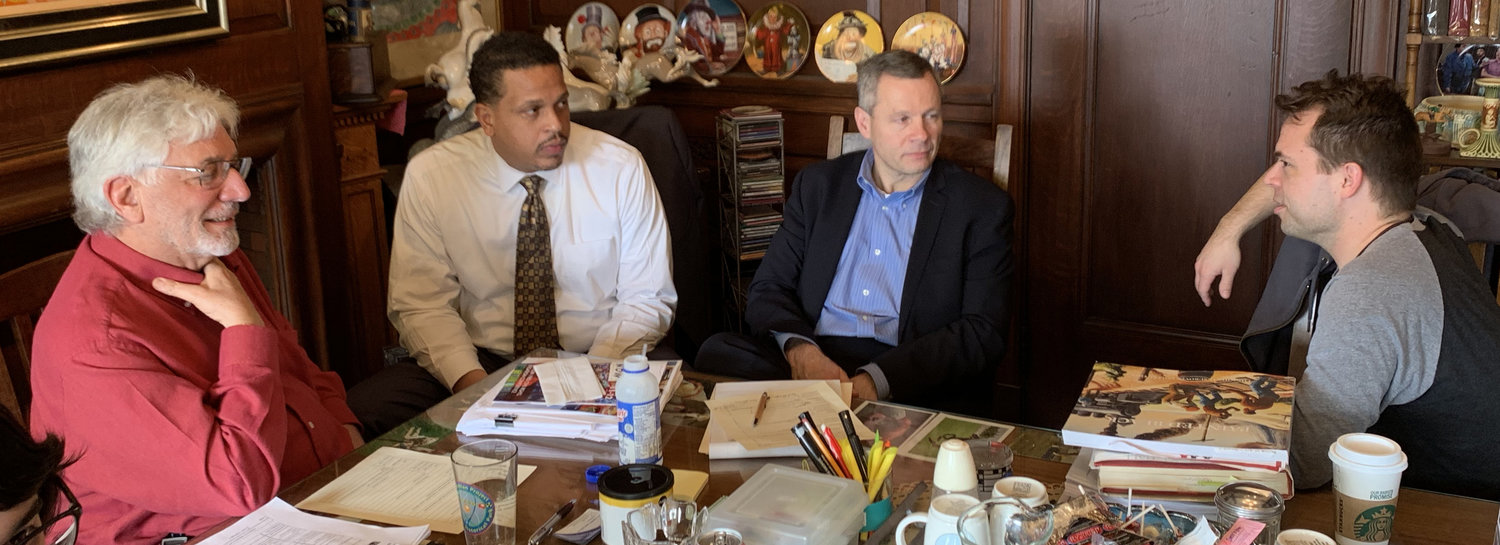WHAT IS THE LEGAL SUMMIT?
Over the past seven years, principals have expressed growing concerns and fears regarding being arbitrarily targeted for multiple investigations, being removed from their schools, and the genuine lack of due process that negatively impacts the professional careers and livelihoods of school leaders. CPAA addressed this head-on starting in 2016 when newly elected President Troy LaRaviere directed our legal counsel to join a lawsuit on behalf of a member, and in 2018 when President LaRaviere cut his own salary in order to hire an organizer and a litigator to file independent lawsuits on behalf of other CPAA members. For the first time in history, CPAA was taking CPS to court on behalf of principals who'd been disciplined or removed without just cause.
On March 8, 2019--after winning court victories for contract and non-contract principals--CPAA took another step forward when he convened the first-ever CPAA Legal Summit to build on these legal gains. The objective of the Summit was to bring multiple legal perspectives to the table to provide a framework for high-quality collaboration and representation of members by identifying the most promising legal counter-strategies. The Summit included six attorneys, all of whom are currently representing CPS principals and assistant principals.

President LaRaviere convenes Summit of Attorneys: From left to right, Andrew Finke (Blaine & Vanzant*), Kamil Merchant (The Quinlan Firm**), Barry Gomberg (Gomberg and Associates), President LaRaviere, James Vanzant (Blaine and Vanzant*), Williams Quinlan (CPAA), and Kenneth Sullivan (The Quinlan Firm**).
The Summit produced several promising action items including strategies to use existing untapped case law to protect members, an injunction to halt unconstitutional suspensions without pay, and a Know-Your-Rights seminar for education leaders. More specifically we discussed the following:
Issues Discussion
Principals are being put on corrective action plans (CAPs) that include numerous demands with no meaningful supports. These CAPs are used to target principals and set them up for failure and termination.
Principals have asserted that CPS officials are setting them up with demands designed to harass and overtax them until they resign. In some cases those officials have explicitly stated their intention to force them to resign. “Constructive discharge” is a legal term used to describe situations in which an employee resigns as a result of the employer creating a hostile work environment. Since the resignation was not truly voluntary, it is, in effect, a termination.
CPS officials engage in a legal waiting game with principals designed to starve them into resigning by suspending them without pay (and without due process) thereby forcing them to resign in order to find other work.
Documentation: There are school leaders who have been removed, and then there are school leaders who are in some stage of interaction with CPS who could become victims. The former have no access to email or Google accounts. Their lack of access creates an information gap during litigation. Educators must collect and store documents in a manner that will ensure they are able to retrieve them should they no longer have access to their offices or CPS email accounts.
It is possible that there has been discrimination based on the race of both the person targeted and the demographics of the school served by the targeted principal.
Inspector General investigations of principals and assistant principals have been conducted in a substandard manner.
CONTACT CPAA AT (312) 263-7767 IF YOU HAVE EXPERIENCED ANY OF THE ABOVE SCENARIOS
Potential Legal Responses
Investigate case law in “set-up-to-fail” circumstances and cases that involve “constructive discharge.” Determine the circumstances in the case law that meet the legal threshold for such cases.
A lawsuit to prevent CPS from suspending any principal or assistant principal without pay unless they have a hearing that meets due process standards
Contacting the Illinois or U.S. Attorney General in regard to the practices of the Office of the CPS Inspector General
Action Items
Develop a database of the circumstances experiences by CPS principals to determine if they meet the legal “set up to fail” or “constructive discharge” thresholds; record the demographics of both the schools and the principals to determine if there is a pattern or practice of discrimination in targeting.
Consistently remind school leaders of the need to contact CPAA’s legal hotline (312) 263-7767 if they are contacted by CPS for questioning or a discipline matter.
Legal know-your-rights seminars for school leaders. Help us gauge interest in the seminar by pre-registering today.
Some principals have been targeted for political reasons; some seemingly because a network chief wanted to place a friend at a school, and some as a result of CPS looking for scapegoats in response to incidents that were caused by CPS’ own understaffing policies. In addition, the Office of the Inspector General has engaged in what appears to be investigative harassment by repeatedly targeting specific principals for questioning. In order to stop baseless targeting of school leaders, we must create a culture in which we push back at every stage of the process. The purpose of the Legal Summit is to plan the next phase of our pushback.
If CPS reaches out to you for a hearing, interview or another kind of questioning, do not attend the meeting without legal representation, even if you believe you have nothing to hide. Contact CPAA at (312) 263-7767 and ask for Mia as soon as CPS reaches out to you.

Gomberg, LaRaviere, Sullivan, and Vanzant discuss strategies to combat "constructive discharge."
Three non-members called CPAA last month hoping to join and get legal representation after being called in for questioning or a disciplinary hearing. One of the hardest parts of our job is informing these school leaders that our legal protections--like any kind of insurance--cannot be accessed after-the-fact. In order to be covered, a school leader must be a member before the incident alleged by CPS. Make sure you are covered: Become a member today.
